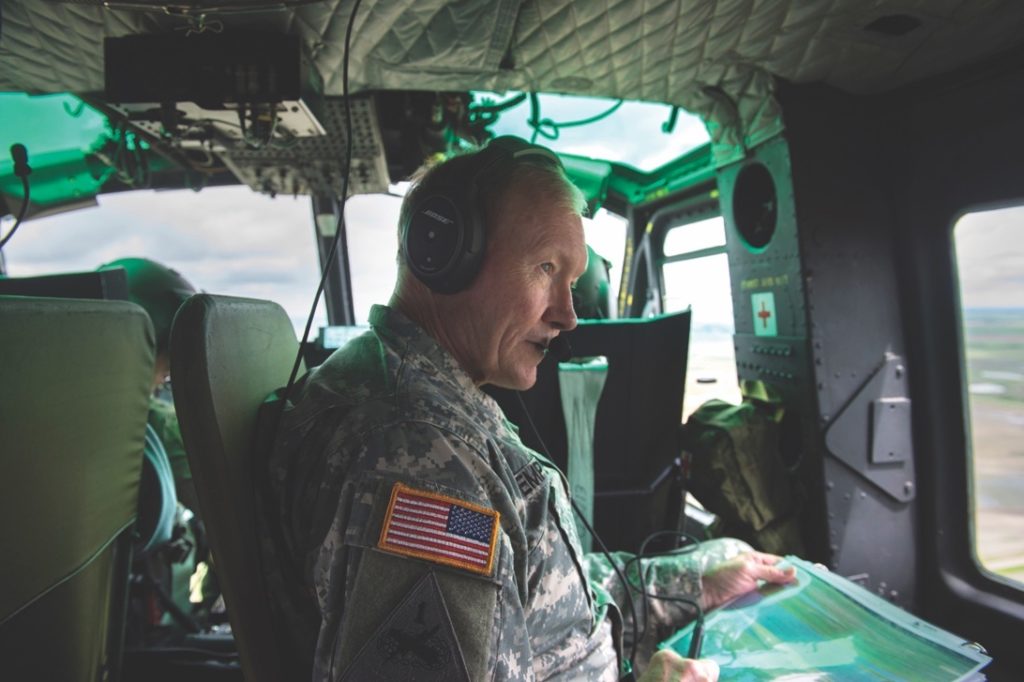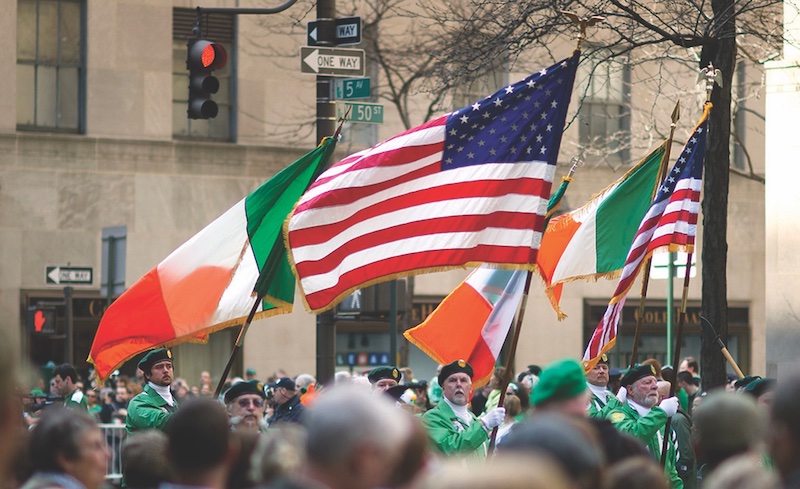“I’m not ready to give up on the anthem and the ritual of standing while its played.”
During operation desert storm, after Iraq’s Republican Guard had been forced out of Kuwait, my brigade set up a checkpoint on the only highway from Kuwait to Baghdad. We established a medical treatment facility and raised the American flag. It was a signal to the oppressed population of southern Iraq. Dozens of Iraqis came to the facility each day, assured by the flag that they would be safe. I kept that flag, and today it hangs in my office, framed with a photograph of the checkpoint.

The memories of my military career are dotted with other flags. A tiny flag placed on the pile of what remained of the World Trade Center in 2001. The 215,000 flags placed in front of simple white headstones in Arlington National Cemetery each Memorial Day. The flag-draped transfer cases arriving home from Iraq or Afghanistan at Dover Air Force Base with the remains of the fallen. The folded flags, far too many, reverently handed to survivors at the graveside of their loved ones.
I’ve seen the flag carried ebulliently around an ice-hockey rink in Lake Placid in 1980 and carried menacingly in an assault on the Capitol in 2021.
In this nation, which values individual freedoms and choices, patriotism ebbs and flows as it is subjected to the shifting winds of domestic politics and our relative sense of security from threats abroad. Its symbols and rituals – the flag, the national anthem – can be honored or desecrated, saluted or scorned, used to draw attention to what unites us or to what divides us.
In recent months, some influential voices have suggested that we should not play the national anthem before sporting events. They argue that routinely playing it cheapens the anthem and promotes a shallow brand of patriotism. They believe that protests during the anthem are another painful reminder of our political polarization.
Meanwhile, athletes who will compete at the U.S. Olympic Trials have been given a menu of acceptable demonstrations and protests by the U.S. Olympic and Paralympic Committee. Among the protests on that list are kneeling on the medal podium and during the national anthem.
But I’m not ready to give up on the anthem and the ritual of standing while it is played. Rituals have a place in our public life. They reinforce our sense of belonging. They allow us to feel as though we have some control over the chaos of everyday life. They give us comfort in their predictability.
Respecting the flag and standing for the national anthem seems to me modest and reasonable gestures of unity in a nation of 330 million people trying to figure out how to live together.
The flag appeared at the innumerable parades of my childhood. In those days, people took almost any excuse to get out, march, and celebrate. New York City had the Thanksgiving Day parade, the Saint Patrick’s Day Parade, and the Easter Parade. Closer to home were local parades on Memorial Day, the Fourth of July, and Opening Day of Little League baseball. The flag was always at the head of the line, prominently displayed, and most everyone stood as it approached. My four grandparents were Irish immigrants, and they stood a little taller when the flag of their adopted country passed by.
The first time I can remember paying serious attention to the flag, though, was on a crystal-clear spring day at Yankee Stadium in the 1950s. As the flag was presented and the anthem began to play, the crowd rose as one. The World War II veterans in the crowd, like my grandparents, seemed to stand a little taller and take the ceremony a little more seriously than others in the audience.
The routine playing of the anthem at sporting events was then a fairly new ritual, but it was quick to take root. The anthem now serves as the prelude to contests of all kinds, a few moments of unity before we loudly and enthusiastically begin to disagree about who should prevail on the field.
But right now, it’s not serving its intended purpose. And it won’t, unless we can better understand that purpose, and agree that it matters.
To me, the national anthem is an expression of our shared belief in this country, one of our very few patriotic rituals. The anthem lasts 90 seconds and offers us the opportunity to pause, and focus on who and what we are together. We can take that minute and a half and think about what’s possible, feel for a moment a sense of belonging with our fellow citizens, put aside our differences, and celebrate with not only those with whom we agree but also those with whom we disagree.
At a deeper level, I consider the anthem an acknowledgment that our democracy is a work in progress. Its words may proclaim this nation “the land of the free and the home of the brave,” but we all know that our aspirations have not always matched our behaviors. The anthem reminds us of what we can be and what we should be, challenging us to consider whether we even understand what it means to be the land of the free.
In an address to the nation in 1941, President Franklin D. Roosevelt listed four fundamental American freedoms: freedom of expression, freedom of worship, freedom from want, and freedom from fear.
These four freedoms are positive and aspirational. Even in our country’s most divisive moments since Roosevelt delivered that speech – and there have been more than a few of them – we have valued these four fundamental freedoms. They have stood the test of time.
But other definitions of freedom exist that are less about what we wish to accomplish and more about what we wish to abandon. The debate about whether we should adhere to the rituals of patriotism – including standing for the anthem – feels like that. We seem poised to declare our freedom from patriotism. Ironically, we are actually free to do that; the question we must ask ourselves is whether we should. For if we decide to free ourselves from our most recognizable American ritual of patriotism, unintended consequences may result. Patriotism, because it is sensitive to the shifting winds of politics, can be manipulated. If some citizens choose to dismiss or ignore patriotism because others aggressively embrace it and claim it as their own, then instead of holding us together, patriotism will become just another thing driving us apart. If patriotism becomes less important to moderate voices, it will become more vulnerable to manipulation by extreme voices.
Mark Twain probably had it about right when he said, “Patriotism is supporting your country all the time, but your government only when it deserves it.”
I understand why, in certain moments, athletes have chosen to kneel during the national anthem. When some among us suffer heinous disrespect and grievous injustice, it’s no wonder that they may begin to lose their sense of belonging and question whether they really are part of America’s future. And peaceful protest has long played an important role in raising awareness about the crucial issues of social justice and racial equality.
But today, we do not lack for times, places, or platforms to express our dissatisfaction with our government, our laws, or one another. If today we pause long enough to listen to the national anthem, that leaves 23 hours, 58 minutes, and 30 seconds in the day. We have plenty of opportunities to highlight our differences. Opportunities to express our hope for one another, though, have grown scarce. That’s one reason I treasure those 90 seconds just before the first pitch, the kickoff, or the tip-off in our ballparks, stadiums, and arenas.
Of course, it’s not as simple as that.
Like all rituals, the national anthem comes with expectations. When we meet those expectations, the focus stays on the ritual. Conversely, violating the expectations of a ritual serves to shift attention from the ritual to us. That can generate empathy and understanding, but also hard feelings and heightened emotions.
As some have suggested, the easiest solution might be to avoid playing the national anthem at sporting events altogether. That, however, would mean giving up on the anthem – and on one another.
The anthem can be used as an occasion for protest, but as that protest becomes routine, it places something vital at risk. To be effective, rituals must be shared; they can’t long be bent to separate purposes, or they will break. And right now, we need things that can bind us to one another more than ever. ♦
ABOUT THE AUTHOR: General Martin E. Dempsey (Ret) served as the 18th chairman of the Joint Chiefs of Staff. He is a Rubenstein fellow at Duke University and chairman of USA Basketball. He was inducted into the Irish America Hall of Fame in March, 2016.

